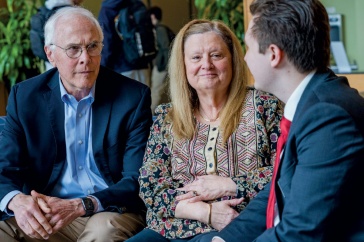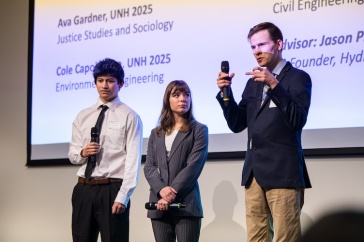
Erik Dodier '92 poses with products created by PixelMEDIA's clients.
Whether in ventures they’ve started themselves or by bringing a fresh perspective to an existing company, these Paul College alumni are changing their industries—and the world—with their innovative ideas.
  |
Erik Dodier ’92
CEO and Founder, PixelMEDIA
Erik Dodier ’92 knows that to be successful in a business that deals in technology, you have to be ready to evolve. He started PixelMEDIA in 1994 with business partner Thomas Obrey to design and develop custom presentations on CD-ROMs and diskettes that companies could mail to their customers instead of printed catalogs or brochures. But as technology evolved, so did PixelMEDIA.
“Today, we focus on helping lifestyle brands in footwear, apparel, sporting goods and specialty foods industries launch, manage and grow their ecommerce businesses,” said Dodier.
How did they go from CD-ROMs to ecommerce? The company evolved to meet the changing needs of their clients.
“By 1995, most of our clients and prospects needed services to build websites, so we adjusted our business model to begin designing and developing websites,” he said.
The company kept up this trend of evolution, bringing them to the present day’s focus on ecommerce.
“The Internet has matured incredibly over the past 20 years, yet there is still continued innovation happening every day. Our most successful innovation has been our ability to keep pace and still be relevant today given all this change,” said Dodier.
Dodier feels that “the best way to predict the future is to create it.” He has emphasized making goals and plans visual for everyone to see.
“We created a wall that displayed our 10-year goals and aspirations in the form of ‘futuristic’ magazine headlines on a dozen of the latest business and technology covers,” he said. “The process of imagining what industry business magazines will be writing about Pixel in the future helps create a picture of what we want to accomplish. We simply then just need to make that picture a reality.
  |
Todd Boucher ’03
Principal and Founder, Leading Edge Design Group
Todd Boucher ’03 works in areas of innovation that can go unnoticed when they are working well: technology and facilities.
In 2007, he founded his company, Leading Edge Design Group, to help organizations create modern, energy-efficient facilities. This can mean designing, installing and supporting everything from data centers to smart buildings and networked-connected systems.
“Regardless of industry, every company relies on technology, and today’s buildings play a vital role in an organization’s success,” said Boucher. “Human-centric factors such as lighting, heating and cooling, and facility design affect workforce engagement, safety, and recruitment goals.”
Leading Edge Design Group’s client roster is as diverse as they come, proving that the need for facility and technology innovation exists in all industries. The company counts among its clients New Balance, Anheuser Busch, TJX Companies, Boston Children’s Hospital, Harvard University, and UNH.
Data centers, in particular, are a need in today’s economy, Boucher said.
“The importance of a data center to an organization continues to increase, especially with the rise in connected devices available through the Internet of Things. A highly available, modernized data center helps companies effectively deliver technology services to internal and external customers.”
Boucher’s role in the company deals with developing Leading Edge Design’s long-term strategy: how can the company position itself to remain in a place where it can take the latest designs and trends in technology and create effective products for clients?
As the creator of a company specializing in innovation in a fast-moving field like technology, Boucher has a knack for knowing what his clients will want next.
“The trend I expect to see is disparate systems becoming fully integrated across common network-based platforms. This integration will enable a true intelligent building,” he said.
  |
Sumner Vanderhoof ’06
Founder and President, Landscape Digital
Founder and CEO, addapptation
Two years after Sumner Vanderhoof ’06 graduated from WSBE, the economy crashed, forcing him to rethink his career path. So he got to work absorbing everything he could about technology, applying his business knowledge to what he learned.
“I started to focus on emerging technology trends and jumped into cloud computing,” he said.
He quickly became an expert in the field, starting his business, Landscape Digital, in 2013 to provide cloud-based technology expertise to business clients. But as his clients’ projects got bigger and more complex, and enterprise software programs came into play, it became harder to make requested client changes in the middle of the work.
“It came to a point where requirements were constantly changing in the middle of projects and we found ourselves doing a lot of rework. As you can imagine, rework gets expensive,” he said.
To keep costs down for his business and for his clients, he came up with the idea to use micro apps. “Micro apps take a large project, break it up into a collection of smaller apps that integrate with one another, and allow for extreme focus,” said Vanderhoof. “We were able to speed up development, lower costs and deliver higher quality work.”
This was the start of addapptation.
“We realized if this process is working for us, it can probably work for others as well. We started addapptation to build a community of developers that can use our technology to build micro apps and sell them on the addapptation marketplace,” he said.
As a result, Vanderhoof has created a new digital market that didn’t exist before.
“We are unlocking the value of developers and enterprise technology in a whole new way. This company is the culmination of years of studying cloud technology and modern business strategy to create something uniquely valuable in this new digital world we live in.”
What he learned at WSBE pulls it all together.
“It is not enough to have a technological innovation, you also need a strategic innovation that resonates through your business,” said Vanderhoof.
  |
Sam Warach ’17
Founder and CEO, NextStep
Founder and CEO, Droppn
Sam Warach ’17 has known he wanted to be an entrepreneur since he bought bulk amounts of Silly Putty online and sold them for a small markup to his middle school friends. But his idea of what that means has changed greatly.
Growing up in New Hampshire, a state greatly affected by the opioid crisis, Warach has loved ones suffering from addiction. He knows all too well that access to treatment for addiction is fraught with obstacles—addicts sometimes can’t find vacancies in treatment centers when they need them, and often relapse as soon as they leave.
“Addiction affects the whole family. And unfortunately, I know the patterns and behaviors from my own experiences with friends and family members who have suffered from substance misuse,” he said. “I knew that something more needed to be done.”
He resolved to address those issues with a web and mobile app, called NextStep, which helps people suffering from substance misuse connect with available treatment centers and also provides them with virtual sponsors to make sure their recovery process continues after they leave.
“NextStep is a passion project that I know needs to be made,” he said.
Others agree: NextStep was a finalist in a national undergraduate entrepreneurship competition, Entrepreneur and Innovation Exchange’s (EIX) E-Fest, as well as a finalist in the 2017 Paul J. Holloway Prize Innovation to Market competition in the spring. And NextStep wasn’t Warach’s only entry into the Holloway Prize competition—he and physics major business partner Max Miller ’20 also took home the competition’s top prize for their second entry, social messaging app Droppn (then called Droppit).
Droppn is a location messaging app designed to enhance a user’s community experience and drive foot traffic to local businesses and events. Droppn utilizes location-based technology to create an enhanced meetup experience for users that integrates with business services like Uber and Lyft. The goal of Droppn is to use a social platform to help people meet up face-to-face. Warach and Miller have just released both iOS and Android versions of the app on the App Store and Google Play.
With Droppn and NextStep, Warach is pursuing entrepreneurial success through two businesses that provide innovative ways to help connect people with those who can improve their community experience and quality of life.
-
Written By:
Whittney Gould | Peter T. Paul College of Business and Economics | whittney.gould@unh.edu | 603-862-1704
















































